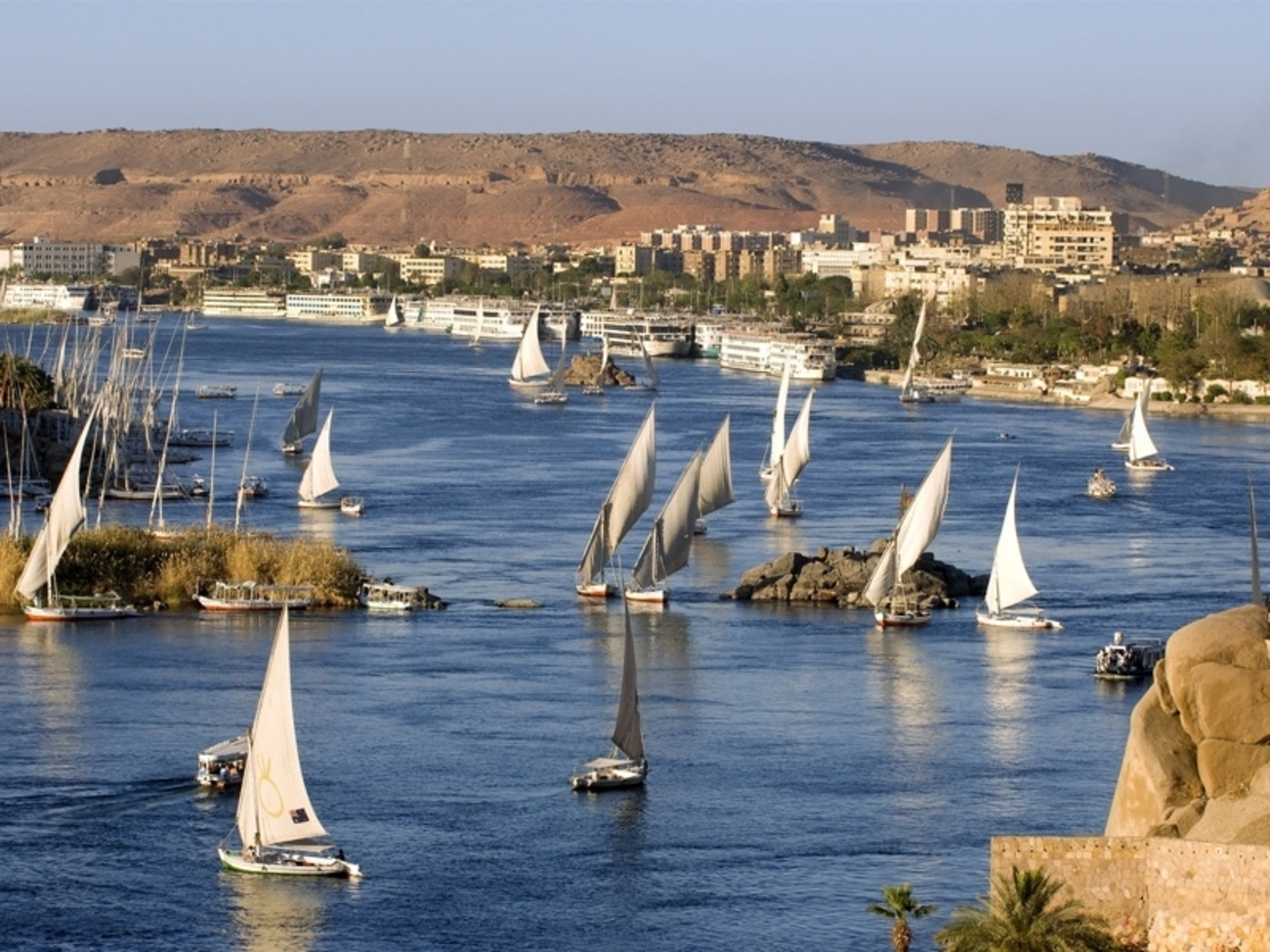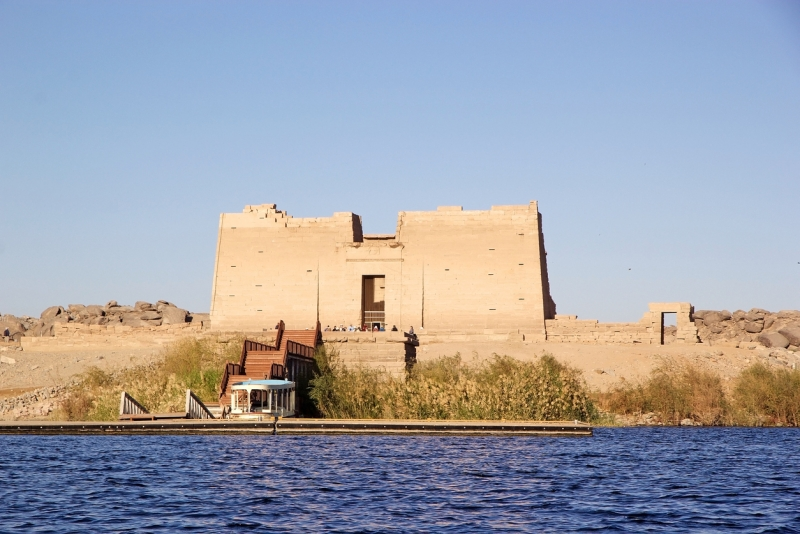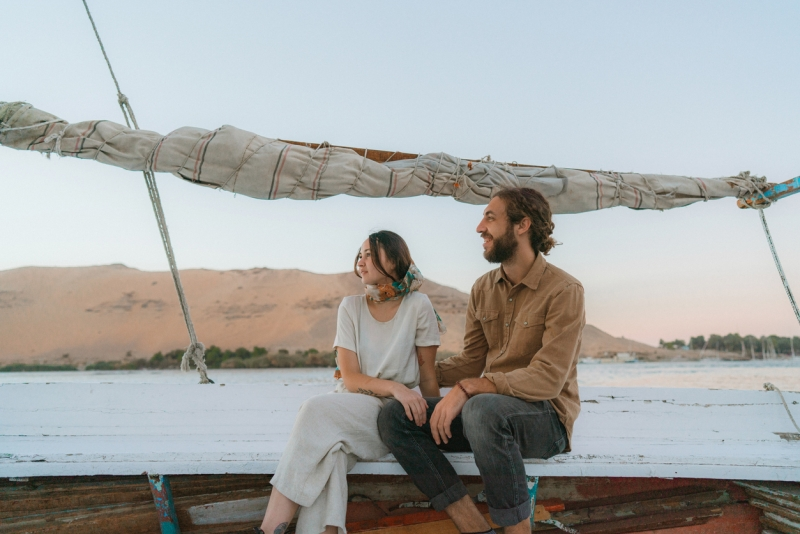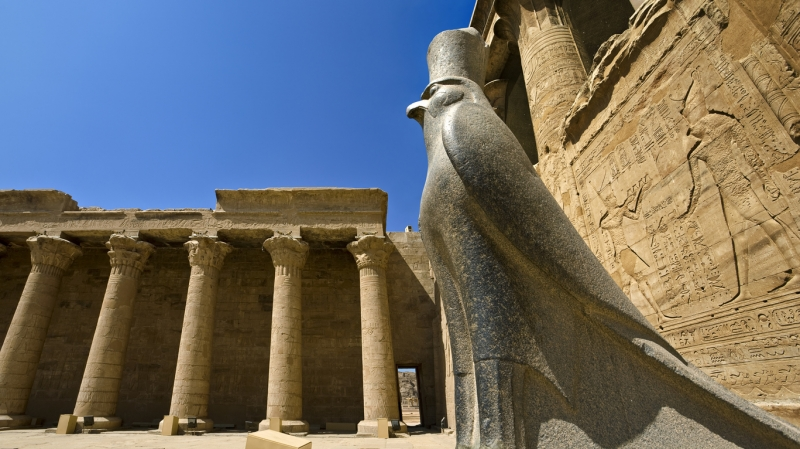Aswan Attractions

Aswan, Egypt's southernmost city, is a historically rich and arid region (less than 1mm annual rain) known as the "Land of Gold" for its ancient Nubian gold mining. It uniquely combines ancient sites like the Unfinished Obelisk with modern engineering marvels such as the Aswan High Dam. The city is also characterized by its island sanctuaries and well-preserved Nubian communities, whose heritage gained significance after displacement by the dam.
Top Historical Attractions in Aswan
Aswan's archaeological monuments constitute an extraordinary chronicle spanning millennia of human achievement, where each stone bears witness to the ingenuity of ancient civilizations and modern preservation efforts. These remarkable structures illuminate the evolution of religious devotion, architectural mastery, and engineering prowess along this sacred stretch of the Nile.
Philae Temple: A floating marvel
Philae Temple, dedicated to Isis, was originally on Philae Island but was threatened by flooding after the 1902 Aswan Low Dam's completion. A decade-long Egyptian-UNESCO effort saved it by moving and reconstructing the entire temple complex on higher ground on Agil
Unfinished Obelisk: Ancient engineering revealed
Discovered in Aswan's granite quarries in the early 20th century, the Unfinished Obelisk is a massive, 42-meter, 1,168-ton monument commissioned by Queen Hatshepsut (c. 1473–1458 BC) for Karnak. Its construction was abandoned due to irreparable fissures in the granite. This colossal, incomplete obelisk serves as an invaluable archaeological site, providing unique insight into ancient Egyptian stone-carving techniques through its preserved tool marks and guidelines.
Aswan High Dam: Modern marvel with ancient impact
Completed in 1970 after eleven years, the Aswan High Dam is a 3,830-meter-wide, 111-meter-high rock-fill barrier that revolutionized Egypt's control over the Nile's floods.
Benefits of this engineering feat include:
- Precision-controlled water distribution optimizing agricultural productivity
- Irrigation systems serving hundreds of thousands of previously arid hectares
- Enhanced navigational conditions throughout the Nile's course
- Annual hydroelectric generation exceeding 10 billion kilowatt-hours
- Expanded fishing industries flourishing within Lake Nasser's waters
However, the dam also resulted in significant human and environmental costs, including the displacement of 90,000 Egyptian and Sudanese Nubian communities due to Lake Nasser's formation, and the gradual reduction of agricultural fertility along the Nile due to the cessation of annual sediment deposition.
Kalabsha Temple: A quiet gem on Lake Nasser
Kalabsha Temple, built around 30 BC by Roman-era craftsmen and dedicated to the Nubian solar deity Mandulis, represents a prime example of Egyptian-Nubian architectural fusion, blending Egyptian religious traditions with Hellenistic art despite being incomplete. Due to the rising waters from the Aswan High Dam, the entire temple was meticulously relocated over two years in the 1960s to New Kalabsha Island. Today, visitors can explore its causeway, colonnaded courtyard, and reliefs.
Cultural Experiences You Shouldn't Miss
The ancient monuments reveal only one facet of Aswan's extraordinary character. The region's living cultural heritage presents equally captivating encounters, where millennia-old Nubian traditions continue to flourish along these storied Nile banks. These authentic immersions offer profound connections to a civilization whose roots extend far deeper than pharaonic Egypt itself.
Explore the Nubian Museum
Designed by Mahmoud El-Hakim, this museum stands as Africa's premier tribute to Nubian civilization, housing over 3,000 artifacts spanning 4,500 years. Its architecture reflects traditional Nubian styles with domed ceilings and earth tones. The galleries lead visitors through Nubia's history from prehistoric to Islamic periods, while an outdoor pavilion features a reconstructed Nubian village. The museum also showcases poignant treasures salvaged by UNESCO's campaign, which would have otherwise been lost to Lake Nasser.
Visit a Nubian Village by boat
Aswan's Nubian settlements, particularly on Elephantine Island and the western shores, offer unique cultural experiences to visitors. These communities showcase their ancient heritage through vibrantly painted architecture. Travelers can arrange visits with local boatmen, where they'll experience traditional Nubian hospitality, including karkade tea and local foods. Many Nubian families continue ancestral crafts like beadwork and weaving, allowing visitors to purchase handmade items directly, supporting artisans and preserving their traditions.
Discover Elephantine Island's local life
Elephantine Island, a mid-river sanctuary near Aswan, offers an authentic look into contemporary Nubian village life within its 5,000-year-old archaeological landscape. Visitors can wander winding paths through colorful villages like Siou and Koti, observing daily life, ancient irrigation methods, and local customs. Community guides provide intimate insights into traditions that persist despite modern influences.
Attend the Philae Sound & Light Show
The Philae Temple Sound and Light Show transforms the temple into a dramatic nocturnal spectacle, using strategic lighting and narration to tell the mythological stories of Isis and Osiris. Unlike daytime visits, this immersive experience emphasizes storytelling and makes complex Egyptian theology accessible to international audiences through various language options. Advance reservations are recommended during peak seasons.

Best Natural and Scenic Spots in Aswan
Aswan's natural magnificence presents travelers with sublime panoramic vistas and serene sanctuaries away from urban intensity. These carefully selected locations demonstrate the region's exceptional geographical beauty, from traditional river navigation to botanical sanctuaries.
Felucca ride on the Nile at sunset
A sunset felucca ride on Aswan's Nile offers a tranquil and authentic experience. These traditional Egyptian sailboats gracefully navigate the river, allowing passengers to witness spectacular sunsets and connect with centuries of Nile navigation. The hour-long excursions typically include hotel transfers and refreshments, providing views of sites like the Aga Khan Mausoleum. This blend of natural beauty and cultural authenticity makes a felucca trip an essential Aswan activity.
Kitchener's Island Botanical Garden
Kitchener's Island, located west of Elephantine Island in Aswan, is a 6.8-hectare botanical garden. Gifted to Lord Horatio Kitchener in the 1890s, he transformed it into a horticultural sanctuary, now home to hundreds of exotic plant species from Africa, India, and the Far East, including over 25 palm varieties, sandalwood, and papaya. Accessible only by river ferry or felucca, late afternoon weekday visits are recommended for the best experience.
Viewpoints from Qubbet El-Hawa
Qubbet El-Hawa, located on limestone escarpments opposite Aswan and north of Kitchener's Island, offers spectacular panoramic views of the Nile and surrounding desert. Its summit provides an unobstructed vantage point over Aswan and towards the Sahara, ideal for photography, especially at sunset. The ascent requires suitable footwear and hydration due to loose sand and granite.
Aga Khan Mausoleum from the river
The Aga Khan Mausoleum, built from pink granite and limestone, is Aswan's most recognizable architectural landmark and the final resting place of Aga Khan III (d. 1957). While its interior is not publicly accessible, its architectural beauty is best appreciated from the Nile. River cruises often slow down, offering excellent photographic opportunities to capture the mausoleum's refined design and commanding riverside presence.

Day Trips from Aswan Worth Taking
The archaeological treasures lying beyond Aswan's boundaries represent some of ancient Egypt's most extraordinary achievements, each site bearing witness to millennia of pharaonic grandeur and religious devotion. These carefully planned expeditions unveil monuments that exemplify the pinnacle of ancient Egyptian artistry and engineering prowess.
Abu Simbel Temples: A full-day journey
Located 280 kilometers south of Aswan, the Abu Simbel temple complex is a UNESCO World Heritage site consisting of two magnificent rock-cut sanctuaries: the Great Temple of Ramesses II and the Temple of Hathor for Queen Nefertari. Famous for its colossal statues and its remarkable relocation in 1968 to save it from Lake Nasser, visits usually involve an early morning three-hour drive. Guided tours with Egyptologists typically cost around $60 per person.
Kom Ombo Temple and Crocodile Museum
Kom Ombo Temple, located 50 kilometers north of Aswan, is a unique dual temple dedicated to the crocodile god Sobek and the falcon god Horus. Adjacent to it, the Crocodile Museum, opened in 2012, displays an impressive collection of mummified Nile crocodiles (2-4.30 meters long), along with embryos, eyes, ivory teeth, and Sobek statues, all illustrating the ancient Egyptians' deep veneration for crocodiles.
Edfu Temple: The best-preserved in Egypt
Construction of Edfu Temple commenced in 237 BCE under Ptolemy III, requiring 180 years to reach completion. Desert sands concealed this architectural masterpiece until archaeologists uncovered it during the 1860s, resulting in Egypt's most impeccably preserved ancient temple. The monumental structure extends over 140 meters in length and encompasses approximately 7,000 square meters, showcasing extraordinary reliefs and inscriptions that illuminate Hellenistic period linguistics, mythology, and religious practices.

Customize Your Dream Vacation!
Get in touch with our local experts for an unforgettable journey.
Plan Your Trip
Where to Stay and Eat Like a Local
Aswan's hospitality landscape encompasses establishments that have witnessed decades of distinguished guests alongside intimate venues where genuine Egyptian warmth flourishes. This curated selection reflects both palatial grandeur and authentic local character, offering discerning travelers exceptional access to the city's finest accommodations and culinary traditions.
Top hotels with Nile views
Aswan's top hotels offer diverse experiences: the historic Sofitel Legend Old Cataract Hotel, open since 1899 and famed for inspiring Agatha Christie's "Death on the Nile," provides opulent Nile views. The Mövenpick Resort Aswan, on Elephantine Island, offers modern elegance and panoramic river views from private balconies. For a more intimate stay, the boutique Sonesta Nouba Hotel features 45 rooms designed with authentic Nubian aesthetics and private Nile-view terraces.
Best local restaurants in Aswan
For authentic cuisine in Aswan, El Dokka Restaurant on Eissa Island offers traditional Nubian dishes with city views. Makani Restaurant provides fresh juices and grilled specialties in a tranquil riverside setting, appealing to health-conscious diners. Nubian Dreams Restaurant & Café on Elephantine Island serves regional cuisine like camel tagine with Nile views. King Jamaica Restaurant offers a unique fusion of Nubian and Jamaican flavors.
Dining at the Old Cataract Hotel
The Old Cataract Hotel's gastronomic offerings deserve particular recognition among Aswan's culinary institutions. The Terrace provides extraordinary panoramas of Khnum Temple while presenting exquisitely crafted cuisine, establishing its reputation as Aswan's most coveted dining reservation. 1902 Restaurant honors over a century of gastronomic excellence within architectural splendor inspired by Cairo's historic Qualaun Crypt. Oriental Kebabgy invites guests to recline upon gilded banquettes while savoring aromatic grilled meats, all while maintaining commanding Nile vistas.
Budget-friendly guesthouses on Elephantine Island
For budget-conscious travelers, Aswan offers excellent hospitality at places like The Mango Guest House (from €33), JJ Guesthouse (from €30), and Bob Marley Guest House, all providing comfortable, air-conditioned stays at affordable prices. Many Nubian guesthouses, such as Kato Dool Nubian Resort, also offer authentic meals, stunning rooftop views, indigenous artwork, and handcrafted furnishings from prime riverside locations.
The top attractions in Aswan include the Philae Temple, Unfinished Obelisk, Aswan High Dam, and Kalabsha Temple. Visitors should also explore the Nubian Museum and take a felucca ride on the Nile at sunset for a truly memorable experience.
To experience Nubian culture, visit a Nubian village by boat, explore Elephantine Island's local life, and attend the Philae Sound & Light Show. The Nubian Museum also offers insights into the rich history and traditions of this ancient civilization.
Aswan offers beautiful natural scenery, including Kitchener's Island Botanical Garden, viewpoints from Qubbet El-Hawa, and the Aga Khan Mausoleum seen from the river. A felucca ride on the Nile at sunset is particularly picturesque.
Yes, popular day trips from Aswan include visits to the Abu Simbel Temples, Kom Ombo Temple and Crocodile Museum, and Edfu Temple. These excursions offer opportunities to explore some of Egypt's most impressive ancient sites.
For accommodation, consider hotels with Nile views like the Sofitel Legend Old Cataract Hotel or budget-friendly guesthouses on Elephantine Island. For dining, try local restaurants like El Dokka or Nubian Dreams for authentic cuisine, or enjoy a luxurious meal at the Old Cataract Hotel's restaurants.













